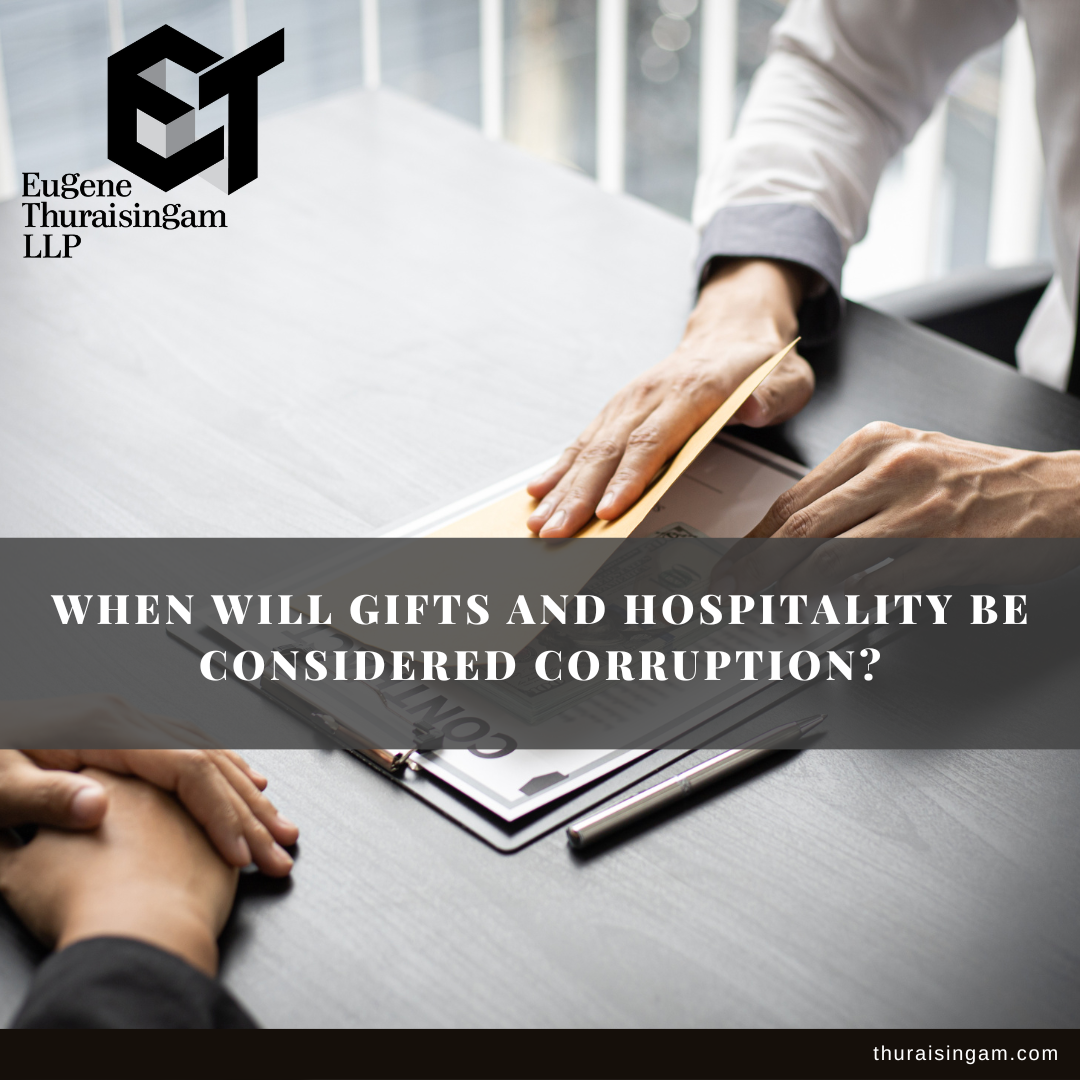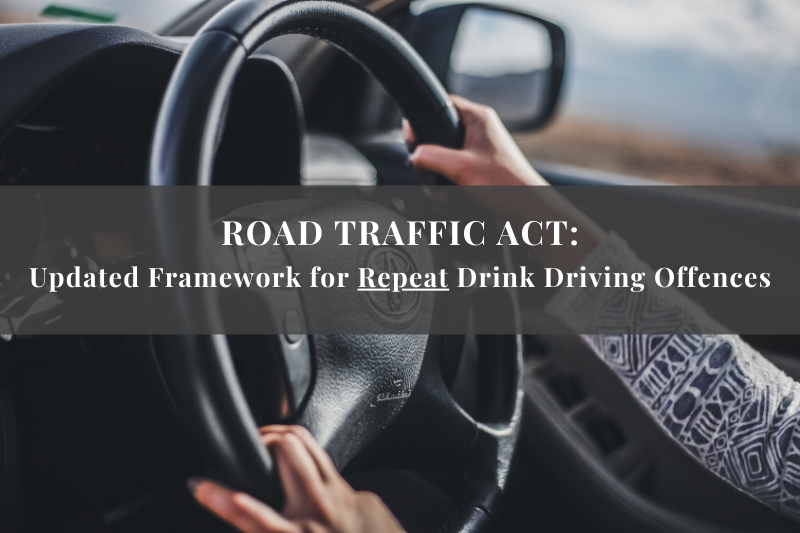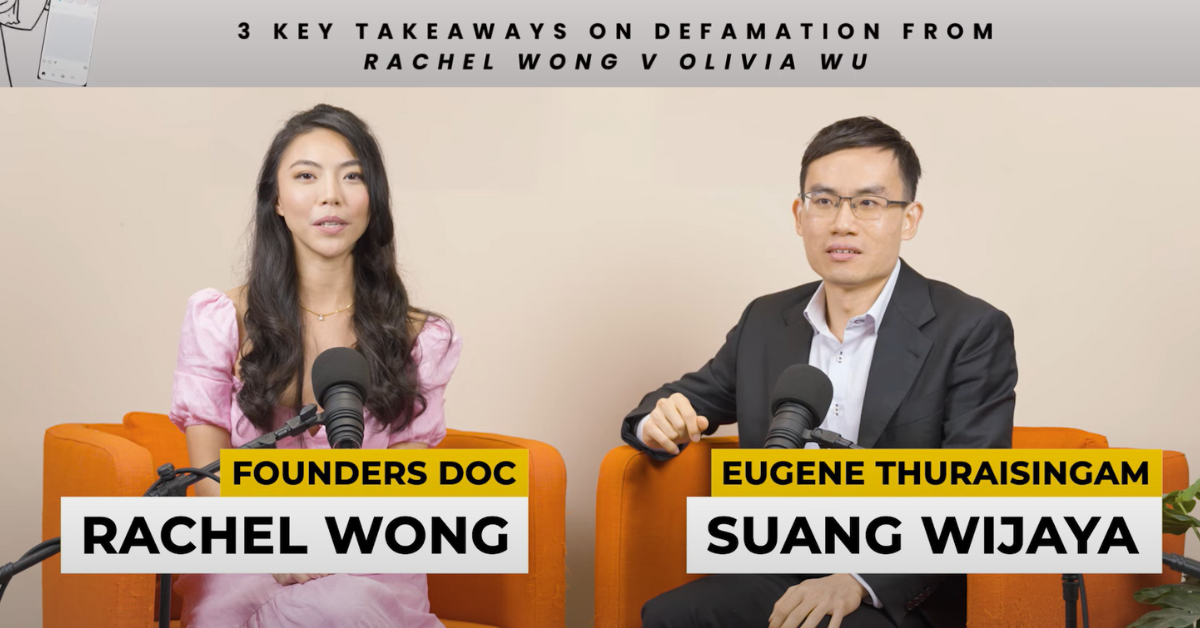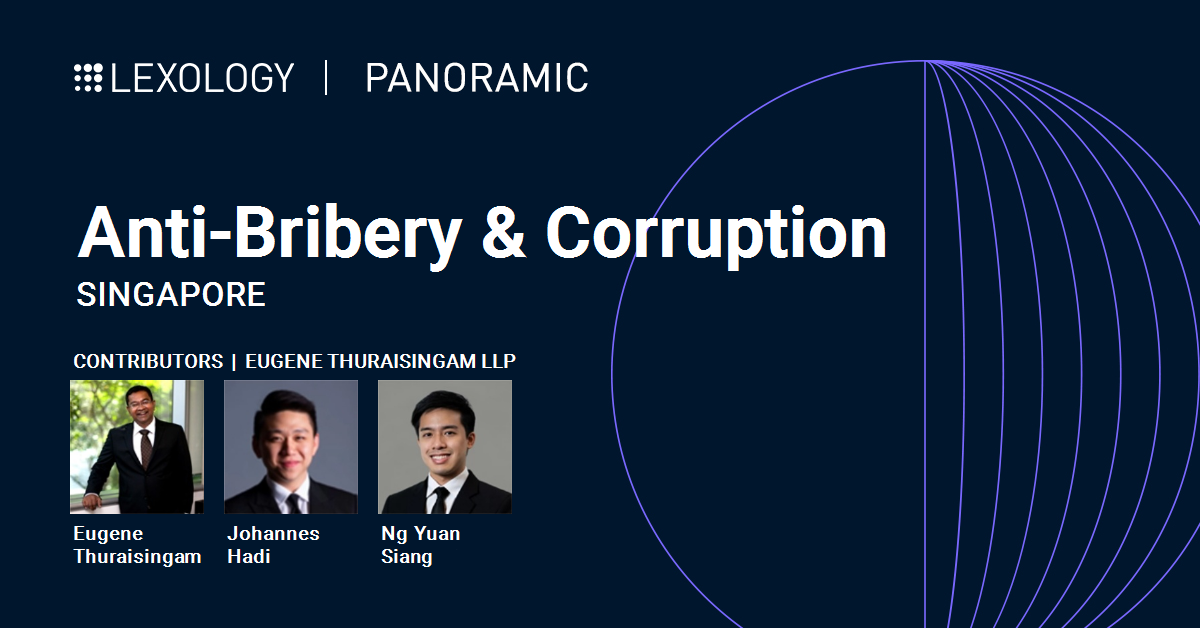When will gifts and hospitality be considered corruption?
Overview
In Singapore, a country known for its strict anti-corruption laws, it is important for individuals and businesses to understand when gifts and hospitality could be considered corrupt practices. While it is common to exchange gifts or provide hospitality in business dealings, it is crucial to navigate these practices with caution to avoid running afoul of Singapore’s corruption laws.
What constitutes an offence of corruption?
Under the Prevention of Corruption Act 1960, the main offences of corruption are outlined in sections 5 and 6. Section 6 prohibits corrupt transactions with agents, such as bribing an employee of a business to do things in relation to that business, while section 5 covers all other instances of corruption.
Corruption revolves around the giving and receiving of ‘gratification’ as an incentive or reward for performing a specific action. Gratification is defined broadly,[1] including not only money but also services, gifts, property, employment, contracts, favours, special privileges, and more. It is commonly known as a bribe.
Both the giver and receiver can be guilty of an offence even if there was only an offer or agreement and the gratification was not actually provided. For transactions with agents, it does not matter if the agent had any power, right or opportunity to carry out any act or favour, or if they even did so.[2]
It is important to note that evidence indicating that gratification is customary in any profession or trade will not be admissible.[3]
Corruption in the public sector
Singapore’s laws on corruption in the public sector are particularly strict, and the consequences for corrupt practices can be severe. When it comes to situations involving the public sector, any gratification that has been given or received will be presumed to have been given or received corruptly unless proven otherwise.[4]
In addition, the law prohibits the solicitation or acceptance of any gratification by public officials if it could influence their decision-making or create the appearance of impropriety.[5] It is essential to be aware of these regulations and to handle gifts and hospitality with caution when dealing with the public sector in Singapore.
What is required to prove an offence of corruption?
There are four elements that need to be proven for an offence of corruption:[6]
- The giving or receiving of gratification
- As an inducement or reward for any person doing (or refraining from doing) something
- There was an objective corrupt element in the transaction
- The gratification was given or received with guilty knowledge
First element: The giving or receiving of gratification
As mentioned earlier, even an offer or agreement to give or receive gratification can be considered an offence under Singapore’s anti-corruption laws. Furthermore, this element will be satisfied even if the recipient of the gratification has not had any opportunity to perform any act or favour in return for the gratification.[7]
Second and third elements: The inducement or reward was given or received corruptly
The second element relates to the causal link between the gratification and the act the gratification was intended to procure or reward,[8] while the third element relates to whether that act was objectively dishonest.
In considering these two elements, the court will examine whether the person who gave or received the gratification believed that it was in exchange for conferring a dishonest gain or advantage on the giver. To counter this, the person may demonstrate that the gratification was given or received without any ulterior motive and that they regarded it as a gift that did not require any reciprocation.[9]
It is important to note that the test for the third element of corruption is objective in nature. First, the court will infer what the person intended when they entered into the transaction. Subsequently, the court will determine whether a reasonable person would consider such an intention to be corrupt.[10]
When inferring the intention behind a transaction, the court will have regard to surrounding circumstances such as:
- Breaching ethical rules or codes: Where an employee’s acceptance of a commission is not in violation of their employer’s policies and where the employee has not acted improperly in the eyes of their employer, this is a compelling indicator that there is no corrupt element[11]
- Knowledge or consent of principal: A principal’s views cannot dictate how the law would characterise their agent’s conduct, but if the principal had known or consented, it would be a compelling indication that there was no corrupt element in the transaction[12]
- Prior communication before payment of gratification: There is no need for evidence of an express request for a bribe, or an express reference to a favour[13]
- The proximity of time between the act of the receiver and the giving of gratification: The proximity of time between the two events can raise a suspicion that the events were inextricably linked[14]
- Secrecy: Acting secretively can be an indication that an act is corrupt, but it is not a conclusive factor[15]
- Quantum of gratification: The amount or value of the gratification is a relevant consideration in assessing whether it was intended to be a gift or a bribe[16]
- Relationship between the parties: It may be argued that a special relationship between the parties might provide an innocent explanation for the gratification[17]
- Sexual gratification: The existence of an intimate relationship in which sexual gratification was involved would ordinarily be strong evidence to negate corrupt intent[18]
Fourth element: The giver or recipient had guilty knowledge
The fourth element relates to whether the person knew or realised that what they did was corrupt by the ordinary and objective standard. Therefore, it is possible for a person to have believed that their actions were corrupt, but unbeknownst to them, the transaction was entirely legitimate. Similarly, a transaction may have a corrupt element, but the person was operating under the mistaken belief that it was lawful. In either of these scenarios, the offence would not be established.[19]
What about the cultivation of business relationships over time?
The case of PP v Wong Chee Meng and another [2020] 5 SLR 807 involved the cultivation of a business relationship over time. Wong, who was the general manager of Ang Mo Kio Town Council (“AMKTC”), admitted to corruptly receiving and obtaining gratification from Chia, a director and shareholder of two companies that had business dealings with AMKTC as a potential contractor for construction work.
The gratifications received were not outright bribes to secure specific contracts, and there was no evidence that any contract awarded by AMKTC to Chia’s companies was due to any gratification received by Wong. Rather, it was a case of cultivation by the giver with mutual benefits in mind.
Multiple types of gratification were given and received, including Chia paying for Wong’s entertainment expenses on 29 occasions as they frequented KTV lounges, restaurants, massage spas and a hotel. Payment for such entertainment expenses would not by itself constitute corruption. It must be shown that it was objectively dishonest, and the giver and receiver had guilty knowledge. In this case, Wong admitted that he corruptly received the gratification.
What are the penalties for corruption?
The penalties for corruption in Singapore under the Prevention of Corruption Act 1960 can be severe. Individuals and corporate entities found guilty of corruption may face a fine of up to S$100,000 and/or up to 5 years’ jail. The maximum penalty is increased to 7 years’ jail in cases that involve corruption while dealing with a contract with the government or any public body.
Conclusion
There is a risk that gifts and hospitality provided to clients may violate Singapore’s corruption laws if not carefully managed. To avoid this, it is important to avoid any suggestion of an expectation of reciprocation or an intention to exert improper influence. Gifts should be purely an act of appreciation, and expenses should be for a legitimate business purpose. When determining whether a corruption offense has occurred, the intentions of the giver and receiver will be the most significant factor.
***
Disclaimer: This article is not to be taken as legal advice. Please contact us for any queries.
[1] Prevention of Corruption Act 1960 Section 2
[2] Prevention of Corruption Act 1960 Section 9
[3] Prevention of Corruption Act 1960 Section 23
[4] Prevention of Corruption Act 1960 Section 8
[5] Prevention of Corruption Act 1960 Sections 11 and 12
[6] Abdul Aziz bin Mohamed Hanib v Public Prosecutor and other appeals [2022] SGHC 101 at [107] – [108]
[7] Tey Tsun Hang v Public Prosecutor [2014] SGHC 39 at [13]
[8] Tey Tsun Hang v Public Prosecutor [2014] SGHC 39 at [16]
[9] Tey Tsun Hang v Public Prosecutor [2014] SGHC 39 at [23] – [24]
[10] Chan Wing Seng v Public Prosecutor [1997] 1 SLR(R) 721 at [20]
[11] Public Prosecutor v Mohamed Abdul Gofar [1997] 1 SLR(R) 23 at [36] – [37]
[12] Public Prosecutor v Mohamed Abdul Gofar [1997] 1 SLR(R) 23 at [38]
[13] Public Prosecutor v Tang Eng Peng Alan [1995] 2 SLR(R) 672 at [20]
[14] Yuen Chun Yii v Public Prosecutor [1997] 2 SLR(R) 209 at [92]
[15] Public Prosecutor v Mohamed Abdul Gofar [1997] 1 SLR(R) 23 at [42]
[16] Yuen Chun Yii v Public Prosecutor [1997] 2 SLR(R) 209 at [76]
[17] Sairi bin Sulaiman v Public Prosecutor [1995] 2 SLR(R) 794 at [42]
[18] Tey Tsun Hang v Public Prosecutor [2014] SGHC 39 at [294]
[19] Chan Wing Seng v Public Prosecutor [1997] SGHC 60 at [23] – [25]

